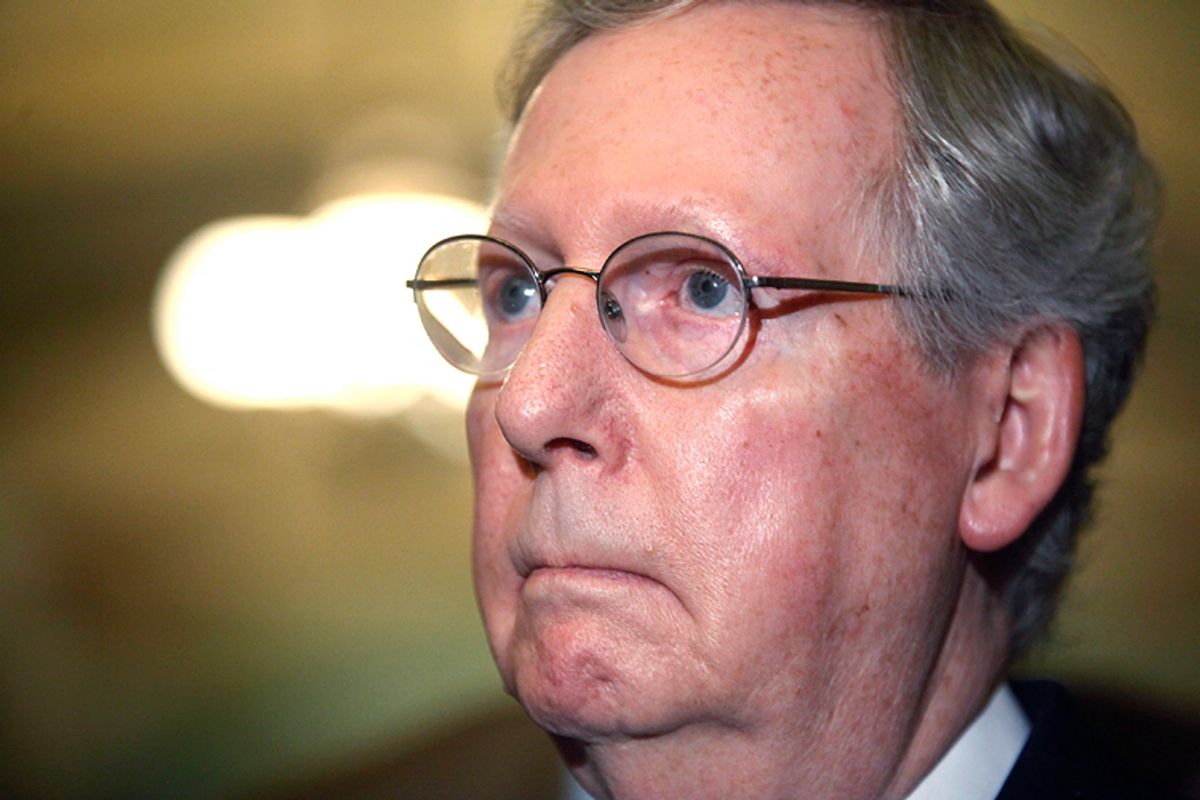A confession: I kind of love Senate Minority Leader Mitch McConnell. I love him in the same self-aware and ironic way I love reading an especially bad Thought Catalog piece, or in the same way I love watching CNBC. In all of these cases, the pleasure stems from experiencing something that is both embarrassingly sincere and totally lacking self-awareness.
To see what I mean, take McConnell’s performance at this year’s CPAC. The Kentucky senator is far from the Tea Party’s favorite. But in a laughably transparent bit of pandering, McConnell hoped to win over the CPAC crowd by bringing a gun with him when he walked to the podium to deliver his speech. He held it awkwardly, delivered a tepidly received speech that had nothing to do with firearms, and then later all but admitted he didn’t even own a single gun, much less the one he brought on stage. The whole embarrassing, failed ruse was like something out of an episode of “Veep.”
So while I’ll be pleased if McConnell loses his bid for reelection to Democrat Alison Lundergan Grimes — there’s next to no chance he’ll lose to Tea Partyer Matt Bevin in the GOP primary — I’ll also be a little sad to see the man who “looks and fights like a turtle” exit the public stage. I’ll have a few reasons for consolation, though. For one, America will be a better-functioning and more humane country without Mitch McConnell near the levers of power. For another, if McConnell ends up losing, there will no doubt be more sublimely terrible campaign moments like this one beforehand. But last, and most importantly, is this: If McConnell ends up having to leave the Senate, it will mostly be his own damn fault.
In spite of being one of the most powerful people in Washington, D.C., for at least the past decade, Mitch McConnell isn’t much of a known quantity outside political geek circles. But when it comes to explaining the failures and frustrations of the Obama years, he’s an absolutely indispensible character. As Vice President Joe Biden told journalist Mike Grunwald, McConnell, from the very beginning of the Obama presidency, demanded his fellow Republicans join him in opposing nearly everything the White House tried to do. Obama accomplished much during his first two years as president. But because of Republican obstruction and Senate filibusters, he failed to do a lot, too.
A bigger stimulus or a second round, spending on infrastructure, filling judicial vacancies, passing a public option, instituting a system of cap-and-trade; while it would be hyperbole to lay the government’s inability to do any of this solely at his feet, the truth is that, more than any other Republican in Congress, McConnell was responsible for pushing the U.S. into total dysfunction. During those first two years, especially, his absolute commitment to partisanship and gridlock was one of the chief reasons “change we can believe in” curdled and soured. The ascendance of the Tea Party? To a significant degree, you can thank Mitch McConnell for that.
Yet it’s starting to look as if McConnell is, like the rest of the country, becoming a victim of his own success. In service of his stated goal of making Obama a one-term president, McConnell was able to essentially break the federal government and convince the vast majority of the American people that D.C. was incapable of addressing the country’s many problems. When it came to making Obama look bad, that plan worked out pretty well. But here’s the problem: Once the Tea Party took over the House, Republicans no longer had the luxury of shirking all responsibility for the public’s dissatisfaction. And since he was in a position of leadership within the party, McConnell, more than most, suddenly had to figure out a way to wreak havoc without getting blamed for the mess.
As his terrible poll numbers in Kentucky can attest, McConnell still is trying to square that circle. Another effect of McConnell’s obstruct-at-all-costs strategy has been the double-edged sword of the Tea Party. It’s true that without the Tea Party, it’s unlikely Republicans would have such a vise-like grip on the House. But, at the same time, it’s not impossible to imagine that, without the Tea Party, Republicans by now would have already retaken control of the Senate. In 2010 and 2012, the GOP squandered ripe opportunities to make McConnell’s dream of becoming majority leader a reality by putting forward god-awful Tea Party candidates like Christine O’Donnell, Todd Akin and Sharron Angle. Now, in 2014, the odds look better than even for Republicans that the third time is the charm; and yet this is the moment when McConnell’s return to the Senate looks more doubtful than ever.
Considering the great and lasting damage McConnell’s done to the country, it’d be a mistake to describe this possible outcome — Republicans take the Senate while McConnell takes a hike — as a tragic or cruel irony. Even if he loses, the current Senate minority leader will still be rich and influential. Indeed, like almost every other former elected official, McConnell will probably become even wealthier after he leaves Congress and lands himself a nice lobbying sinecure. He’ll make a lot of money, give some boring corporate retreat speeches, maybe write a memoir, and otherwise be totally fine.
Nevertheless, it will be poetic justice if McConnell’s sunk by the same government dysfunction and far-right counterrevolution he worked so diligently to create. It won’t be nearly as satisfying as watching him at CPAC, pretending to know how to use a rifle, a goofy grin spread across his face. But it’ll give me something to remember him by — besides the shattered and smoldering ruins of the federal government of the United States.

Shares